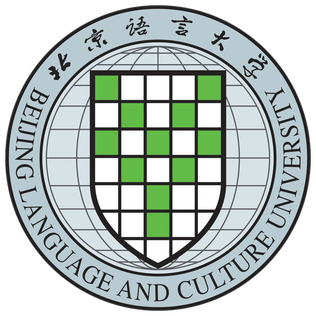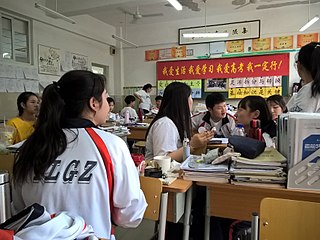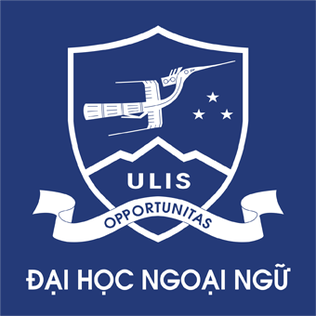Treaty ports were the port cities in China and Japan that were opened to foreign trade mainly by the unequal treaties forced upon them by Western powers, as well as cities in Korea opened up similarly by the Japanese Empire.

Xi'an International Studies University is a public Chinese university located in the northwestern city of Xi'an, China's ancient capital well known for the Terracotta Warriors and a key city in the Western China. XISU is one of the universities with well-known foreign language departments and a member of G8 Universities. The university has three campuses, the north Yanta campus, the South Chang'an campus and Yahe campus, where the university's high school is located.

Shanghai Foreign Language School is a secondary school based in Shanghai, China. It is not a traditional 'language school' as in schools delivering only language teaching. It is a full-time high school providing education to students aged from 11-15 and 15-18. Foreign language teaching is traditionally a specialty.

Beijing Foreign Studies University, is a public university in Beijing, China. BFSU boasts the oldest language programs in China offering the largest number of foreign language majors on different educational levels. Located in Haidian District of Beijing. BFSU is divided into east and west campuses. BFSU offers the widest range of language studies in China: as of September 2023, there are 101 foreign languages being taught in this university. It is a Chinese state Double First Class University identified by Chinese Ministry of Education. BFSU is commonly known as Beiwai in Mandarin. Beijing Foreign Studies University is a sister school to Peking University (PKU) which is also subordinate to the Ministry of Education. For this reason BFSU students are able to register for courses at PKU.

Beijing Language and Culture University, colloquially known in Chinese as Yuyan Xueyuan, has the main aim of teaching the Chinese language and culture to foreign students. However, it also takes Chinese students specializing in foreign languages and other relevant subjects of humanities and social sciences, and trains teachers of Chinese as a foreign language. It used to be the only institute of this kind in China. After the push for massification of higher education starting in the 90s, nowadays many other universities in almost every major city in China have a similar offer. Thus bachelor, master or post-doc degrees in "Teaching Chinese as a second language to Foreigners", as well as bachelor's and master's degrees in several foreign languages, are no longer only to be found at BLCU.

Shanghai International Studies University is China's leading university in linguistics, cultural studies, and global and area studies. Established in December 1949, SISU is known for being one of the earliest institutions where China's higher education in foreign languages took shape. It was listed in the Double First Class University identified by the Ministry of Education and former Project 211.

Hankuk University of Foreign Studies is a private research university based in Seoul, in South Korea. HUFS consistently ranks as one of the best universities in South Korea. The university currently teaches 45 foreign languages. In addition, it contains studies in humanities, law, social sciences, business, medical science, natural sciences, and engineering.

Busan University of Foreign Studies (Korean: 부산외국어대학교), often shortened to 부산외대 and BUFS, romanized as Pusan University of Foreign Studies before 2011, is a private university in Busan, South Korea, which specializes in foreign languages. In 2014, following the completion of a new campus on the slope of Mount Geumjeongsan, the university moved to Namsan-dong.

The University of Aizu in Aizuwakamatsu, Japan, is the first university dedicated to computer science engineering in Japan.

Yerevan Brusov State University of Languages and Social Sciences, is a public university in Yerevan, the capital of Armenia, operating since 1935. It is named after the Russian poet and historian Valery Bryusov since 1962.
Chinese as a foreign or second language is when non-native speakers study Chinese varieties. The increased interest in China from those outside has led to a corresponding interest in the study of Standard Chinese as a foreign language, the official language of mainland China, Taiwan and Singapore. However, the teaching of Chinese both within and outside China is not a recent phenomenon. Westerners began learning different Chinese varieties in the 16th century. Within China, Mandarin became the official language in the early 20th century. Mandarin also became the official language of Taiwan when the Kuomintang took over control from Japan after World War II.

The School of Combined Learning, or the Tongwen Guan was a government school for teaching Western languages, founded at Peking (Beijing), China in 1862 during the late-Qing dynasty, right after the conclusion of the Second Opium War, as part of the Self-Strengthening Movement. Its establishment was intimately linked to the establishment of the Zongli Yamen, the Qing office of foreign affairs.

The Commercial Press is the first modern publishing organisation in China. The Commercial Press is known for its academic translation and publications in humanities and social sciences as well as the Xinhua Dictionary.

The history of education in China began with the birth of the Chinese civilization. Nobles often set up educational establishments for their offspring. Establishment of the imperial examinations was instrumental in the transition from an aristocratic to a meritocratic government. Education was also seen as a symbol of power; the educated often earned significantly greater incomes.
Reinhard Rudolf Karl Hartmann is an Austrian and English lexicographer and applied linguist. Until the 1970s, lexicographers worked in relative isolation, and Hartmann is credited with making a major contribution to lexicography and fostering interdisciplinary consultation between reference specialists.

VNU University of Languages and International Studies, or Hanoi University of Languages and International Studies, is one of the six colleges that comprise Vietnam National University, Hanoi. The school offers undergraduate and graduate degrees in pedagogy and linguistic studies in Arabic, English, French, German, Japanese, Korean, Mandarin Chinese, Russian, Spanish and Thai. The college is located at VNU Cau Giay campus.
The Institute of Modern Languages, also known as IML-UQ, is a language and translation institute located within the St Lucia campus of the University of Queensland (UQ) in Brisbane, Australia. Today IML-UQ enrolls 3000 plus students annually in all of its language programs.

The Standard Chinese word xuanchuan "dissemination; propaganda; publicity" originally meant "to announce or convey information" during the 3rd-century Three Kingdoms period, and was chosen to translate Russian propagándaпропаганда in the 20th-century People's Republic of China, adopting the Marxist-Leninist concept of a "transmission belt" for indoctrination and mass mobilization. Xuanchuan is the keyword for propaganda in the People's Republic of China and propaganda in the Republic of China.

The University of International Business and Economics, is a public research university specialized in undergraduate and graduate education in economics, finance, international business, management, business, law, foreign languages and foreign relations. Established in 1951 in Beijing by China's Ministry of Foreign Trade and Economic Cooperation, it is one of the elite Chinese universities and one of the most competitive and selective universities to enter for undergraduate education in China.
Zhai Xiangjun was a Chinese translator and educator, particularly known for his translation of Gone with the Wind and his university-level English textbooks. He was a professor and vice chair of foreign languages at Fudan University and served as vice president of Shanghai Translators' Association.















